
Convolvulaceae, known commonly as the bindweed or morning glory family, is a family of about 60 genera and more than 1,650 species of mostly herbaceous vines, but also trees, shrubs and herbs, and also including the sweet potato and a few other food tubers.
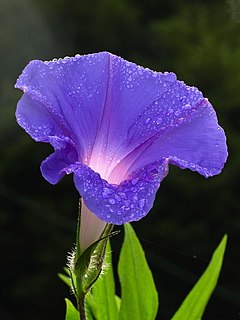
Morning glory is the common name for over 1,000 species of flowering plants in the family Convolvulaceae, whose current taxonomy and systematics are in flux. Morning glory species belong to many genera, some of which are:

Calystegia is a genus of about 25 species of flowering plants in the bindweed family Convolvulaceae. The genus has a cosmopolitan distribution in temperate and subtropical regions, but with half of the species endemic to California. They are annual or herbaceous perennial twining vines growing 1–5 m tall, with spirally arranged leaves. The flowers are trumpet-shaped, 3–10 cm diameter, white or pink, with a sometimes inflated basal epicalyx.

Calystegia sepium is a species of flowering plant in the family Convolvulaceae. It has a subcosmopolitan distribution throughout temperate regions of the North and South hemispheres.

The morning glory Calystegia soldanella is a species of bindweed known by various common names such as sea bindweed, seashore false bindweed, shore bindweed, shore convolvulus and beach morning glory.

Calystegia × pulchra, commonly known as hairy bindweed, is a species of morning glory. It is a climbing plant that may exceed three meters in height. The bright pink corolla may be 5 to 7 centimeters and has distinct white stripes. This species is a weedy wildflower which has naturalized in many areas, including much of Europe and is also grown as an ornamental plant.
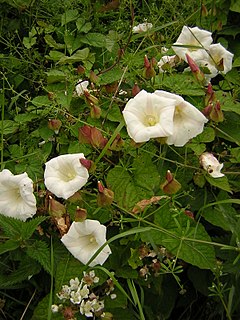
The morning glory Calystegia silvatica is known by the common name giant bindweed or large bindweed. It is the largest species of bindweed and is a strong rampant climber.

Calystegia macrostegia, with the common names island false bindweed and island morning glory, is a species of morning glory in the family Convolvulaceae.
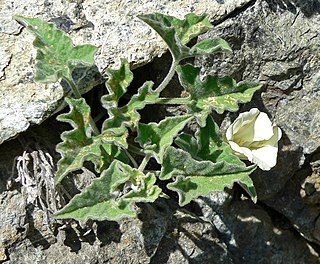
Calystegia collina is a species of morning glory known by the common name Coast Range false bindweed. It is endemic to the Coast Ranges of northern and central California, where it grows on slopes and in woodlands, often on serpentine soils.

Calystegia malacophylla is a species of morning glory known by the common name Sierra false bindweed . It is endemic to California, where it grows in several of the mountain ranges, including the Central Coast Ranges and the Sierra Nevada.

Calystegia longipes is a species of morning glory known by the common name Paiute false bindweed.

Calystegia peirsonii is a species of morning glory known by the common name Peirson's false bindweed.

Calystegia purpurata is a species of morning glory known by the common name Pacific false bindweed.
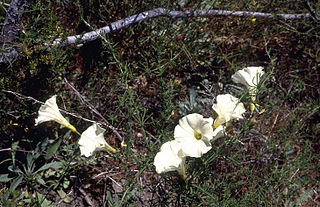
Calystegia stebbinsii is a rare species of morning glory known by the common name Stebbins' false bindweed. It is endemic to the Sierra Nevada foothills of California, where it is known from only two spots in El Dorado and Nevada Counties. It grows in unique habitat in chaparral on gabbro soils. It is a federally listed endangered species.
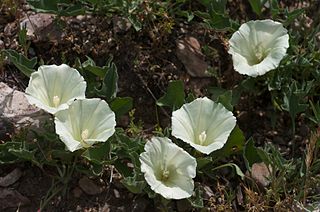
Calystegia subacaulis is a species of morning glory known by the common name hillside false bindweed.

Osmadenia is a genus of flowering plants in the daisy family. It contains the single species Osmadenia tenella, which is known by the common name false rosinweed.
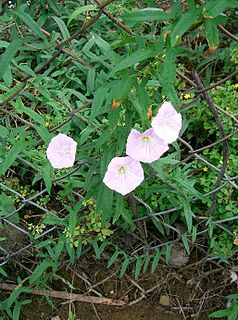
Calystegia pubescens, commonly known as Japanese bindweed, is a species of bindweed. This is a small climbing plant that grows to 20~70 centimeters in height. The corolla is partially pink and is under 4 cm long. This species is a weedy wildflower distributed in South Korea, Japan, and countries in south-eastern Asia. It is able to be distinguished from other bindweeds by its foliage having divided side lobes.
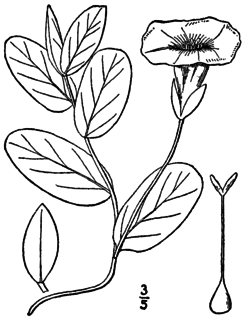
Calystegia spithamaea, which common names include: low false bindweed, low bindweed, erect bindweed, and upright bindweed, is a plant.

The morning glory Calystegia tuguriorum is a species of bindweed known as New Zealand bindweed, pōuwhiwhi, and pōwhiwhi. It is a perennial vine which grows in coastal and lowland areas throughout New Zealand, as well as being present in Chile and on the Juan Fernandez islands.



















